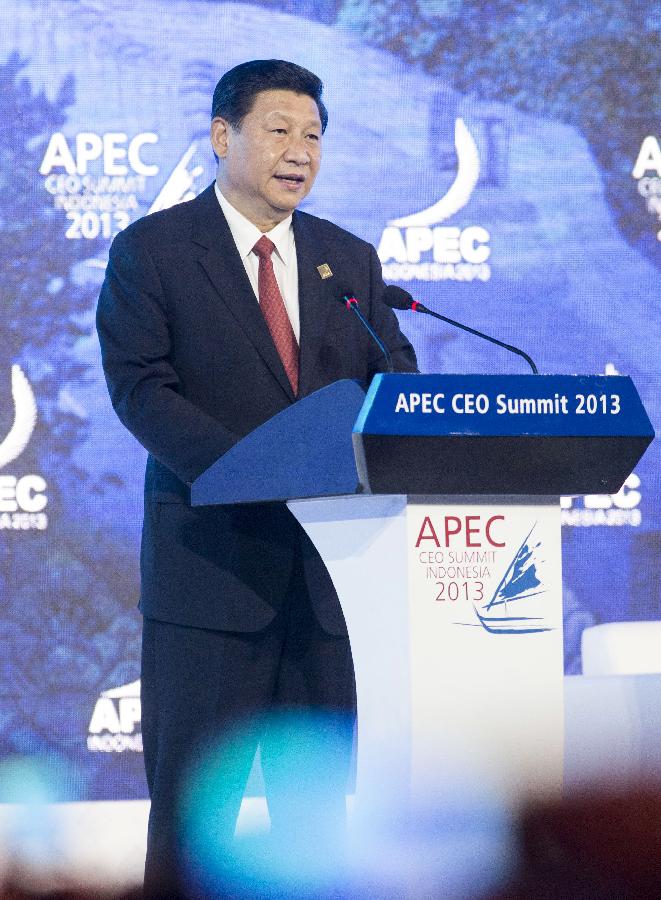China committed to regional peace
 0 Comment(s)
0 Comment(s) Print
Print E-mail Xinhua, October 8, 2013
E-mail Xinhua, October 8, 2013
Chinese President Xi Jinping said Monday that China is committed to promoting regional peace and development, and building a cross-Pacific cooperation framework.
 |
|
Chinese President Xi Jinping speaks at the APEC CEO Summit in Bali, Indonesia, Oct. 7, 2013. (Xinhua/Wang Ye) |
Xi made the remarks while addressing an Asia-Pacific Economic Cooperation (APEC) CEO Summit on the Indonesian resort island of Bali.
"China will firmly uphold regional peace and stability, and help cement the foundation for a win-win situation in the Asia-Pacific," said the Chinese leader.
He hoped that all regional members could work together to build a harmonious Asia-Pacific of "enduring peace" and "common prosperity."
Xi said his country will also work to boost regional development and prosperity, and expand opportunities of mutual benefit in the area, adding that with its growing domestic demand, China will offer foreign investors more chances for cooperation.
For many Asia-Pacific economies, China is their biggest trading partner, top export market and a major source of investment. Last year, China has contributed more than 50 percent to Asia's overall economic growth.
Meanwhile, by the end of 2012, China has attracted some 1.3 trillion U.S. dollars of foreign direct investment, and signed 12 free trade agreements with 20 countries and regions, with six still under negotiations.
Xi also told the summit that China, in the coming five years, will import over 10 trillion dollars of goods and invest more than 500 billion dollars abroad, suggesting even more profitable opportunities for cooperating with China.
Beijing will also commit itself to building a "cross-Pacific regional cooperation framework" that can bring benefits to all parties, said Xi.
"We should enhance coordination on macro-economic policies and among regional free trade arrangements, and deepen regional integration" for closer partnership across the Pacific and long-term development within the area, he urged.
Speaking of what the Asia-Pacific's future should look like, Xi said the regional economies should build a region that seeks common development.
He called on the developed economies to provide stronger support and assistance to the developing markets. In the future, the Asia-Pacific should also stay committed to open development, promote innovation-driven development, and pursue interconnected growth, said Xi.
The Chinese leader said all members should maintain a multilateral trading system that is free, open and non-discriminatory, and oppose all forms of protectionism.
While pointing out that it is too costly to base growth on excessive resources consumption and environmental pollution, Xi said green and low-carbon development should be pursued.
He also noted that many of the regional members, especially the emerging and developing economies, need huge financial support to develop their infrastructure, which is key to maintaining economic growth and promoting connectivity and integration.
To do that, Xi suggested an Asian infrastructure investment bank be established so as to "fuel the sustained and steady growth of the Asian economy."
Also in his speech, the Chinese president described the industrial and business communities a "major force" for economic and trade development, as well as "an integral part in APEC cooperation."
He added that enterprises from other APEC members are welcome to invest in China, and be a part of China's endeavors of reforms and opening-up.
After wrapping up his state visits to Indonesia and Malaysia, the Chinese President arrived in Bali on Saturday afternoon to attend the APEC meeting, his first appearance at the summit since taking over the presidency in March.
During his stay on Bali island, Xi has met with a series of world leaders and representatives attending the meeting.
This year's APEC gathering, themed "Resilient Asia-Pacific, Engine of Global Growth," highlights such topics as achieving sustainable growth with equity, promoting inter-connectivity in the region, and attaining the Bogor Goals, a timeline for achieving free and open trade and investment in the Asia-Pacific.
APEC, a premier economic forum in the Asia-Pacific region established in 1989, has been committed to dismantling barriers and bottlenecks that interfere with business while nurturing closer economic ties.
The organization has grown to encompass 21 members across the Asia-Pacific region, accounting for approximately 55 percent of global gross domestic product (GDP) and 44 percent of world trade, according to data provided on its official website.
As the highest-level meeting of the APEC, the informal economic leaders' meeting has been held annually since its first convention in Seattle, the United States in November 1993.





